16 start with R start with R

In Raft of Flame, Alvarez constructs and fleshes out a fantastic narrative of personal and cultural history, offering glimpses into the art, history, and land that comprise her story. Her narrative explores how both nature and human populations continue to be trapped in the violence of colonialism. Vivid lyrics interrogate the complexities of mixed race, digging the dualities, upheavals, and casts of characters that underly Alvarez’s identity.
Raft of Flame won Omnidawn's 2018 Lake Merritt Prize.
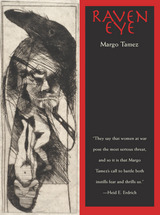
These complex and necessary themes are at the heart of award-winning poet Margo Tamez’s second book of poetry. Her poems bring forth experiences of a raced and gendered life along the border. Tamez engages the experiences of an indigenous life, refusing labels of Mexican or Native American as social constructs of a colonized people. This book is a challenging cartography of colonialism, poverty, and issues of Native identity and demonstrates these as threats to the environment, both ecological and social, in the borderlands. Each poem is crafted as if it were a minute prayer, dense with compassion and unerring optimism.
But the hope that Tamez serves is not blind. In poem after poem, she draws us into a space ruled by mythic symbolism and the ebb and flow of the landscape—a place where comfort is compromised and where we must work to relearn the nature of existence and the value of life.

Raúl R. Salinas is regarded as one of today's most important Chicano poets and human rights activists, but his passage to this place of distinction took him through four of the most brutal prisons in the country. His singular journey from individual alienation to rage to political resistance reflected the social movements occurring inside and outside of prison, making his story both personal and universal.
This groundbreaking collection of Salinas' journalism and personal correspondence from his years of incarceration and following his release provides a unique perspective into his spiritual, intellectual, and political metamorphosis. The book also offers an insider's view of the prison rebellion movement and its relation to the civil rights and anti-war movements of the 1960s and 1970s. The numerous letters between Salinas and his family, friends, and potential allies illustrate his burgeoning political awareness of the cause and conditions of his and his comrades' incarceration and their link to the larger political and historical web of social relations between dominant and subaltern groups. These collected pieces, as well as two interviews with Salinas—one conducted upon his release from prison in 1972, the second more than two decades later—reveal to readers the transformation of Salinas from a street hipster to a man seeking to be a part of something larger than himself. Louis Mendoza has painstakingly compiled a body of work that is autobiographical, politically insurgent, and representative.
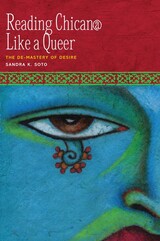
A race-based oppositional paradigm has informed Chicano studies since its emergence. In this work, Sandra K. Soto replaces that paradigm with a less didactic, more flexible framework geared for a queer analysis of the discursive relationship between racialization and sexuality. Through rereadings of a diverse range of widely discussed writers—from Américo Paredes to Cherríe Moraga—Soto demonstrates that representations of racialization actually depend on the sexual and that a racialized sexuality is a heretofore unrecognized organizing principle of Chican@ literature, even in the most unlikely texts. Soto gives us a broader and deeper engagement with Chican@ representations of racialization, desire, and both inter- and intracultural social relations.
While several scholars have begun to take sexuality seriously by invoking the rich terrain of contemporary Chicana feminist literature for its portrayal of culturally specific and historically laden gender and sexual frameworks, as well as for its imaginative transgressions against them, this is the first study to theorize racialized sexuality as pervasive to and enabling of the canon of Chican@ literature. Exemplifying the broad usefulness of queer theory by extending its critical tools and anti-heteronormative insights to racialization, Soto stages a crucial intervention amid a certain loss of optimism that circulates both as a fear that queer theory was a fad whose time has passed, and that queer theory is incapable of offering an incisive, politically grounded analysis in and of the current historical moment.

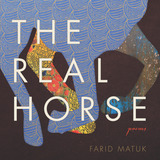
Offering a handbook on the possibilities of the verse line, this collection is precise in its figuring, searching in its intellect, and alert in its music. Here lyric energy levitates into constellations that hold their analytic composure, inviting readers into a shared practice of thinking and feeling that interrogates the confounding intersections of gender, race, class, and national status not as abstract concepts but as foundational intimacies.
Matuk’s interrogations of form cut a path through the tangle of a daughter’s position as a natural-born female citizen of the “First World” and of the poet’s position as a once-undocumented immigrant of mixed ethnicity whose paternity is unavoidably implicated in patriarchy. Rejecting nostalgia for homelands, notions of embodied value (self-made or otherwise), and specious ideas of freedom, these luminously multifaceted poem sequences cast their lot with the lyric voice, trusting it to hold a space where we might follow the child’s ongoing revolution against the patrimony of selfhood and citizenship.
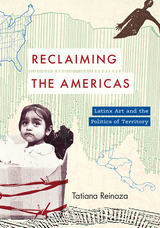
2023 Outstanding Book Award, National Association for Ethnic Studies
Finalist, 2024 Charles Rufus Morey Book Award, College Art Association
How Latinx artists around the US adopted the medium of printmaking to reclaim the lands of the Americas.
Printmakers have conspired, historically, to illustrate the maps created by European colonizers that were used to chart and claim their expanding territories. Over the last three decades, Latinx artists and print studios have reclaimed this printed art form for their own spatial discourse. This book examines the limited editions produced at four art studios around the US that span everything from sly critiques of Manifest Destiny to printed portraits of Dreamers in Texas.
Reclaiming the Americas is the visual history of Latinx printmaking in the US. Tatiana Reinoza employs a pan-ethnic comparative model for this interdisciplinary study of graphic art, drawing on art history, Latinx studies, and geography in her discussions. The book contests printmaking’s historical complicity in the logics of colonization and restores the art form and the lands it once illustrated to the Indigenous, migrant, mestiza/o, and Afro-descendant people of the Americas.
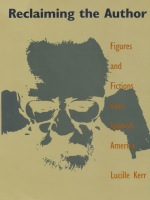
By focusing on works by well-known Spanish American authors—Cortazar, Donoso, Fuentes, Poniatowska, Puig, and Vargas Llosa—Kerr shows how the Spanish Americans have formed a radical poetics of the author. Her readings demonstrate how exemplary Spanish American texts, such as Rayuela, Terra nostra, and El hablador, call into question the author as a unitary or uniform, and therefore unproblematical, figure. Individually and together, Kerr's readings reclaim "the author" as a complex critical concept encompassing diverse, conflicting, even competitive roles.
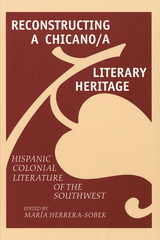
CONTENTS
Introduction: Reconstructing a Chicano/a Literary Heritage, by María Herrera-Sobek
Part I: Critical Reconstruction
Shipwrecked in the Seas of Signification: Cabeza de Vaca's La Relación and Chicano Literature, by Juan Bruce-Novoa
Discontinuous Continuities: Remapping the Terrain of Spanish Colonial Narrative, by Genaro Padilla
A Franciscan Mission Manual: The Discourse of Power and Social Organization, by Tino Villanueva
The Politics of Theater in Colonial New Mexico: Drama and the Rhetoric of Conquest, by Ramón Gutiérrez
The Comedia de Adán y Eva and Language Acquisition: A Lacanian Hermeneutics of a New Mexican Shepherds' Play, by María Herrera-Sobek
Part II: Sources of Reconstruction
Poetic Discourse in Pérez de Villagrá's Historia de la Nueva México, by Luis Leal
Fray Gerónimo Boscana's Chinigchinich: An Early California Text in Search of a Context, by Francisco A. Lomelí
"¿Y Dónde Estaban las Mujeres?": In Pursuit of an Hispana Literary and Historical Heritage in Colonial New Mexico, 1580-1840, by Tey Diana Rebolledo
Entre Cíbolos Criado: Images of Native Americans in the Popular Culture of Colonial New Mexico, by Enrique Lamadrid

Set against the backdrop of the Obama presidency, Julian Randall's Refuse documents a young biracial man's journey through the mythos of Blackness, Latinidad, family, sexuality and a hostile American landscape. Mapping the relationship between father and son caught in a lineage of grief and inherited Black trauma, Randall conjures reflections from mythical figures such as Icarus, Narcissus and the absent Frank Ocean. Not merely a story of the wound but the salve, Refuse is a poetry debut that accepts that every song must end before walking confidently into the next music
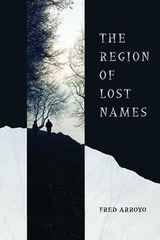
Ernest is searching for a place where he can live beyond his past. His family has returned to Puerto Rico, and Ernest remains in the States, desiring only distance from his memories of childhood displacement and work, his parents’ tumultuous relationship, and his own love for Magdalene. Magdalene, too, looks to move beyond her memories as she follows Ernest’s family home, seeking resolution to her mother’s hurtful secrets, her father’s unknown identity, and her love for Ernest.
As Ernest moves through the fields of Michigan, as Magdalene traverses the jungles of Puerto Rico and the shores of the Caribbean, they discover that their dreams and identities are linked within the framework of their families and their pasts. Together, Ernest and Magdalene must come to terms with the secrets and mistakes made by the previous generation, the histories of disloyalty and abandonment, of secrecy and sorrow.
Their struggles take place in a region of lost names, where loves and memories are banished and found. Fred Arroyo writes a story in two voices, following Ernest and Magdalene by turns in prose that is elegant and lyrical. His words evoke another world lush with the scent of salt spray, the taste of mangoes, and the rush of leaves, alive with characters whose ardors and pathos are achingly real. Arroyo explores the ebb and flow between past and present and themes that are enduring. Ultimately, Ernest and Magdalene must live with more than their memories; they must rediscover the intimacies of the region of lost names.
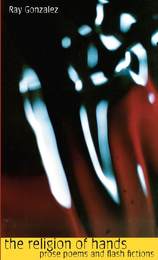
The Religion of Hands does not foster sleep. Look quickly and you will catch the hint of a fox streaking in front of your car’s headlights at night. Look more carefully out your bedroom window and you may see your life going by, lost loved ones waving hello.
"Who were you when the stars were misinterpreted as the fingertips of God?"
Ray Gonzalez blends symbolic play with lyrical beauty as he works from a vast and complex palette to infuse popular culture with myth. The Religion of Hands is imbued with magical realism: a suffocating dream of tamales, mysterious reptilian allusions, a man who "finds God walking down the stairs to hand him an old, tattered phonebook from the year he was born." It offers strange prophecies: "A steady vegetation will grow across the empire as more homeboys are killed in drive-bys. . . . Microscopic scratches on an old vinyl record will form a message discovered in twenty more years when the album is bought at a garage sale." And in 14 flash fictions, it tells of a tiny old man kept in a glass jar, an accordion stored in an old family trunk, tales of sharks and bandits. The religion of hands has its own unspoken sacraments. "The fingers take over, teaching whoever holds the moment that the rapid weight of the open hands is a dangerous way to live."
Seamlessly, effortlessly, multi-dexterously, Ray Gonzalez spins words that speak our very dreams.


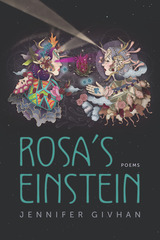
In this full-length poetry collection, the girls of Rosa’s Einstein embark on a quest to discover what is real and what is possible in the realms of imagination, spurred on by scientific curiosity and emotional resilience. Following a structural narrative arc inspired by the archetypal hero’s journey, sisters Rosa and Nieve descend into the desert borderlands of New Mexico to find resolution and healing through a bold and fearless examination of the past, meeting ghostly helpers and hinderers along the way. These metaphorical spirits take the shape of circus performers, scientists, and Lieserl, the lost daughter Albert Einstein gave away.
Poet Jennifer Givhan reimagines the life of Lieserl, weaving her search for her scientist father with Rosa and Nieve’s own search for theirs. Using details both from Einstein’s known life and from quantum physics, Givhan imagines Lieserl in a circus-like landscape of childhood trauma and survival, guided by Rosa and Nieve.
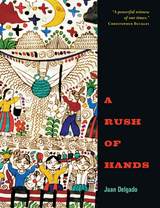
These poems deal honestly with the realities of urban life, whether dramatizing the effects of drive-by shootings, unfolding a labor protest that "spreads across the city like a prayer," or summoning a ghostlike immigrant damned to retrace his journey across the border. Daily and historical struggles are elevated to the level of myth. Yet, amid these poems there are images of life and love: a girl leaving hickeys rich as chocolate, a boy pledging to rescue his mother from poverty, a man studying the desert ground for tracks signaling immigrants in distress.
Delgado is unflinching in showing us the harshness surrounding the lives he cherishes, and with resonant details and lyrical language he urges us to examine those lives-and ultimately our own. A Rush of Hands is a spellbinding book that will captivate both the ear and the heart.
READERS
Browse our collection.
PUBLISHERS
See BiblioVault's publisher services.
STUDENT SERVICES
Files for college accessibility offices.
UChicago Accessibility Resources
home | accessibility | search | about | contact us
BiblioVault ® 2001 - 2024
The University of Chicago Press









